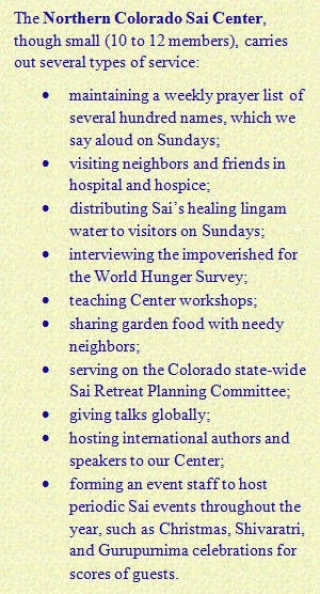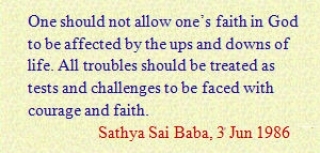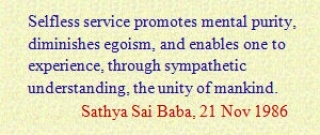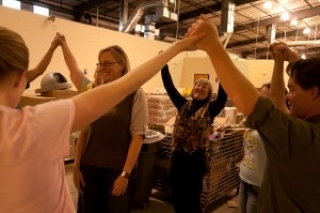
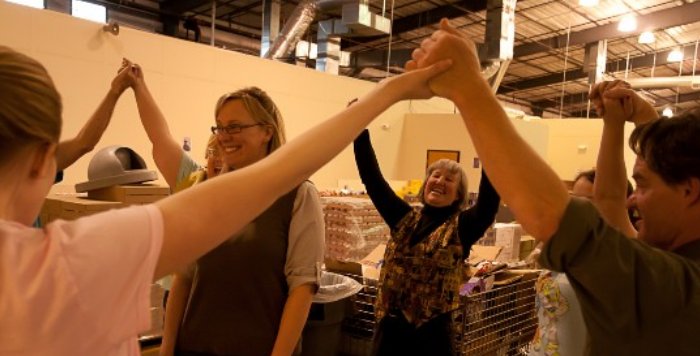
Upgrading Our Center Service Project
“How can we do more service for Sai Baba and for those in desperate need, without over-turning the fragile little boat of our well-established but small Sai Center?” I often asked myself. “We can do much more!”
As Center president of a very small Sathya Sai Baba Center in the sparsely populated Colorado ranchlands, 40 minutes north of Denver, Colorado, it had come to my attention since 2007 that the group was ready to be inspired and prepared to upgrade our main selfless service project. The ten of us had been successfully doing four or five minor projects, yet we felt that a team project outside the Center would be a spiritual deepener and a community contribution.
Thus it was that after donating food and funds to the Weld Food Bank in Greeley, Colorado, for eight years, we agreed to commit to enrolling in the Food Bank Warehouse Volunteer Training. If, after the training, we were still committed to working one night a month as a team, we would commit indefinitely to our service project upgrade. For the past two and a half years, we have successfully developed a cheerful, competent, dependable team of food bank volunteers, without losing any members and without the complaints, power struggles, or arguments that sometimes plague such projects. Our organizational name is TEAM SAI, in which SAI stands for Service in Action Initiative.
Before the upgrade, some research was necessary for the group. In fact, we had to learn the answers to the questions we are often asked by other Centers in North America that are interested in carrying out a similar project.
For many reasons (see details in Part 2, here) our Sai Center members felt we could easily and capably fill the drastic need for county volunteers. As a final assessment of our potential dependability, this author requested divine input, and it came. We needed new guidelines and criteria for ensuring that we would be excellent volunteers who would be “low-maintenance” for the food bank warehouse and that the extra service activity would not threaten the weekly Center meeting attendance or other projects in place.
“DMST” (Do More Service Today!):
Is the project Doable? Manageable? Sustainable? Trainable?
In meditation, Sai Baba gave us a four-part readiness-assessment guideline for our Center, which may be applied to any Sai Center in the world. Our criteria for service upgrade involves a simple mnemonic device: Do More Service Today, or DMST (Doable, Manageable, Sustainable, Trainable).
D= Is It Doable? Is the project doable with the current members’ ages, lifestyles, time, health, and stamina?
Our Answer: This seemed like the perfect project for our ten members, four men and six women, ranging in ages from 21 to 74. All are in good physical condition with adequate stamina to lift boxes and to bend and stretch in the warehouse. Even more important, they all have a good sense of humor, work well as a team, don’t complain, and would represent the group well in the community.
M= Is It Manageable? Who will be in charge of member contacts, reminders, and updates, as a liaison between the Sai Center and the community organization? Is that person honest, trustworthy, and dependable? Where’s the indication of a track record of success in dependability? Do they faithfully attend meetings, contribute leadership, and keep harmony, rather than engage in drama and conflict in the group?
Our Answer: Our current service coordinator, though a fairly new devotee, met all the requirements wonderfully. The other officers and members are available for back-up support, if necessary. But the job description is clear that she is the project leader and must see to it that the required eight people or more are committed to coming each time, on time (which means 15 minutes early for all events) and “on purpose,” with a cheerful, can-do attitude.
S= Is It Sustainable? What is the likelihood that the members will sustain their momentum, attendance, and enthusiasm over time? Will they commit to a year or two, and then renew after that? How can the project continue to be compelling, and how can the members deepen their spirituality and gratitude and grow in their leadership skills in the project, over time?
Our Answer: The project, due to the extreme and growing hunger in America and in Weld County, Colorado, has kept us not only interested but has caused us to raise our own food consciousness. Most members now grow their own gardens, do vegetable composting, and have learned to freeze and dry food for family use instead of wasting food or eating out often, as in former times. The group has learned many new skills, such as creating several thousand backpacks for youth at risk the past year; building emergency food boxes for needy families and elders; and sorting donated food items for expiry dates, leaks, and suitability for hungry recipients.
T= Is It Trainable? Most community service organizations today have a strong volunteer department, complete with a volunteer coordinator, a newsletter, training sessions, and annual volunteer recognition dinners or events. Weld Food Bank has a superb volunteer department and coordinator, who gives safety training and awareness classes to all new groups who join the 1,500 existing county volunteers who feed the hungry in the county.
Do-able, Manageable, Sustainable, Trainable . . . Then What?
-
What is your exit strategy? Always have an exit strategy! If members relocate, retire, go off to college, die, become incapacitated, etc., the added instability can put the project in jeopardy. Ensure that even if you or your group decide to move on, move up to greater state or national service, or re-think the commitment, there will be other volunteers in place to pick up the slack.
Our Answer: If we ever decide to re-think our involvement, 1,500 other volunteers will still be working for the food bank. So far we are growing in teamwork and leadership and thoroughly enjoy our project involvement. - Apply your learning to other life areas: Consider the problem you are addressing via service, such as hunger, and reflect on whether new legislation needs to be enacted in your state re zoning (for example, allowing for city food-animals, such as chickens or milk-goats, for family self-sufficiency); food safety (re GMO foods); labor laws (for protecting the health of field workers from pesticides, injustice, and so on).
- Teach what you know: Share your knowledge and skill-sets with Center members. The Northern Colorado Sai Center has frequent workshops, taught by our members, on gardening, camping, self-reliance, preparing for emergencies, and first aid. We have camped together, taken field trips, shared articles, traded books, and stayed in frequent contact between meetings.
-
Insist on harmony: Harmony is essential for every service project.
Our Answer: At our meetings at Grace House, Harmony Farm, we treat each other with respect, love (we celebrate the “birthdays of the month”), and friendliness; we also welcome newcomers with warmth and interest, teaching them what we know on a myriad of topics. Attendees who prefer conflict and discord have quickly moved on. - Create a mission statement for yourself, your family, and your center. Since we are big fans of clear and not muddled or fuzzy thinking, we like the expression, “If you don’t know where you are going, how will you ever reach your destination?” It is immensely helpful to have clear goals for one’s life (qualities, virtues, accomplishments), your lifetime service, and for growing your Center in its service “output.” Baba says that “Most think knowledge is power; but in fact, character is power.”(1)
What we have learned and how we have grown
Northern Colorado Sai Center members, when asked to reflect on their growth and learning from both Center and individual service projects, have usually prefaced their answers with a chuckle, since the lessons keep coming. The current center service coordinator says, “It’s been fun to see the group become more bonded as a smoothly-functioning team, especially since we live in different towns in the area and primarily see each other at Sai meetings. We’ve really grown, and nobody complains about the work or occasional changes in our assigned tasks.”
Another member, a college music major, likes to regale the warehouse Sai volunteers with new songs as we fill backpacks for disadvantaged youth. “This project makes me realize how fortunate we are, compared to most of the population,” she says. “I have also enjoyed working as a volunteer for Kid’s Café, which provides hot meals and snacks for children after school and in the summertime.”
The center vice president says that she enjoys the amount of work that gets accomplished in less than two hours each month. “It’s so much fun to see how the ladies collapse the food boxes and how the men move the large cartons for us, build new commodity boxes, and organize the pallets that we stack with hundreds of boxes each night after filling them. Together, we really do know how to tackle a job with joy and laughter and to meet and exceed our goals in a short time! I look forward to any time we can work together.”
As for this author and her transformation during the various stages of said service project, there are many things to say. First, I fell in love with our Sai Center members all over again and have seen new depths of beauty in their character. Second, I thank Sai Baba over and over for directing us to this service opportunity and to working with the tremendous people at the food bank. Third, my love for the poor, the hungry, and the suffering has greatly expanded. Now I often go up to strangers who are in pain or who are destitute or hungry and ask them how I can help them right now: what do they need and when did they last eat? I take them to lunch, give them some water, a snack, and some cash, or gift them with an energy treatment.
In service to the Golden Age
In conclusion, even though the economic times seem gloomy around the world, we know from Sai Baba’s discourses and teachings that we are still in the Sandhi Yuga, or short intermediate period between two great eras (the Piscean Era and the Aquarian Age). We are reminded of the saying, “Turn your face to the sun, and shadows will only fall behind you.” As you read this, the Golden Age of Peace and Plenty is emerging, with a huge global outpouring of healings and miracles, while the old paradigm is simultaneously unraveling to make way for the new, for the sustainable satvic (pure, balanced) values of peace, truth, love, right action, and nonviolence, which will be the firm foundation for the New Era.
During a personal interview with Sai Baba several years ago, this author asked, “Lord, when will the Golden Age finally be here?” He paused awhile and said, “It won’t be long, just several years. When you and others become peaceful and show others how to do so, with your love, then eventually we will have world peace and the Golden Age. But it starts within each person.” Baba further says, famously, that the surest path to spiritual growth is service to others: “The hands that serve are holier than the lips that pray.”(2) Thus, the message is clear: “Do more service today. Upgrade your service. Serve with every breath!” And don’t forget that service is a joy and a privilege, which, when accompanied by merriment, makes it the frosting on the cake of your life – or rather, GOD’S LIFE being lived through you!
Go to Part 2.
Additional Info
(1) Sathya Sai Baba, Prema Vahini, ch 1 http://www.sssbpt.info/vahinis/Prema/Prema01.pdf
(2) Sathya Sai Baba, 1 Jan 2004 http://www.sssbpt.info/ssspeaks/volume37/sss37-01.pdf
To learn more about or join this service project, you may go to: http://us.sathyasai.org/index.htmland click on the state or city in which the Sai Center project takes place. Click on “Email us for information about these Centers.” A local contact will respond to your email.
Keywords
Food Bank volunteering | Northern Colorado Sai Center | Johnstown, Colorado | USA Region 9 | Sathya Sai service projects USA | Weld Food Bank, Greeley COProject Details
Project start: 01/01/07
Project completion:
Stage of development:
Zone name: US. Canada, West Indies, Israel
Lat/Longitude: 40° 20' N -104° 54' W
Affiliation: Sathya Sai Center of Northern Colorado, CO
Service category: Food Bank
Author: Connie B Shaw
Project leader: Molly Isackson
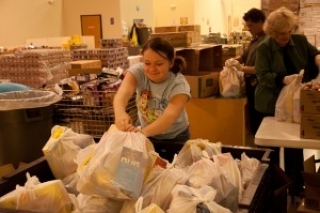
Celebrating loving hard work at Weld Food Bank
